Book contents
- Frontmatter
- Contents
- Preface
- Introduction
- Part One Rights, Obligations and Responsibilities
- Part Two Human Rights Issues
- 10 Fragile Identities and Constructed Rights
- 11 Affirmative Action: Compensation or Discrimination?
- 12 Ethics, Human Rights and the LGBT Discourse in India
- 13 Distributive Justice: Locating in Context
- 14 Punishment and Human Rights
- 15 Rights of the ‘Mad’ in Mental Health Sciences
- 16 Choice, Life and the (m)Other: Towards Ethics in/of Abortion
- 17 The Nationalist Project and the Women's Question: A Reading of The Home and the World and Nationalism
- 18 On the Idea of Obligation to Future Generations
- 19 Morality in Cyberspace: Intellectual Property and the Right to Information
- 20 Violence – A Right to the Survival of the Self?
- 21 ‘Moral Obligation’ to Fight for the Prevention of Greater Calamity: A Debate between Sādharana Dharma and Sva Dharma
- 22 Globalisation and Human Rights
- Notes on Contributors
22 - Globalisation and Human Rights
from Part Two - Human Rights Issues
Published online by Cambridge University Press: 05 March 2012
- Frontmatter
- Contents
- Preface
- Introduction
- Part One Rights, Obligations and Responsibilities
- Part Two Human Rights Issues
- 10 Fragile Identities and Constructed Rights
- 11 Affirmative Action: Compensation or Discrimination?
- 12 Ethics, Human Rights and the LGBT Discourse in India
- 13 Distributive Justice: Locating in Context
- 14 Punishment and Human Rights
- 15 Rights of the ‘Mad’ in Mental Health Sciences
- 16 Choice, Life and the (m)Other: Towards Ethics in/of Abortion
- 17 The Nationalist Project and the Women's Question: A Reading of The Home and the World and Nationalism
- 18 On the Idea of Obligation to Future Generations
- 19 Morality in Cyberspace: Intellectual Property and the Right to Information
- 20 Violence – A Right to the Survival of the Self?
- 21 ‘Moral Obligation’ to Fight for the Prevention of Greater Calamity: A Debate between Sādharana Dharma and Sva Dharma
- 22 Globalisation and Human Rights
- Notes on Contributors
Summary
The present millennium is different from all earlier such occasions. We have the most delicate and advanced scientific knowledge, the most capable and sophisticated technology, the fifth generation microprocessors with knowledge and information; but do we have wisdom to make use of all these, so that there is human face impressed on these achievements? One of the features of human history has been that people, resources, ideas and consciousness move from one place to another, and in the wake of globalisation they are moving all too fast and getting transformed gradually; but what has been the role of values in such movements and transformations? Is our identity getting lost in the process of globalisation? Since the proclamation of the Universal Declaration of Human Rights on 10th December 1948 by the United Nations Organization, there have been intense and endless debates and discussions so far as the legal, political, cultural, ethnic, social and philosophical aspects are concerned. Indeed, the need for the Declaration of Human Rights has arisen from the sense of insecurity faced by human beings after World War II. Moreover, it raises the questions of human dignity, self-respect, right to live and work in the world that has become the driving force and furtherance of human rights. As a matter of fact, globalisation has intervened human life and activity since 1975 onwards, and since 1990 it has become unavoidable and inevitable.
- Type
- Chapter
- Information
- Applied Ethics and Human RightsConceptual Analysis and Contextual Applications, pp. 315 - 326Publisher: Anthem PressPrint publication year: 2010



